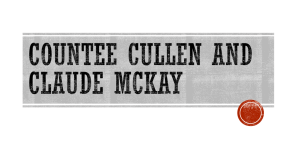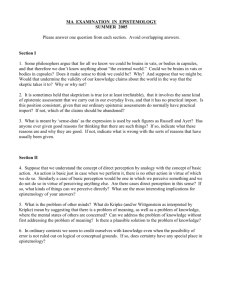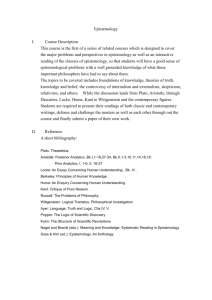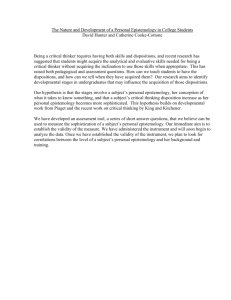An Epistemology of Possibilities - Society for the Advancement of
advertisement
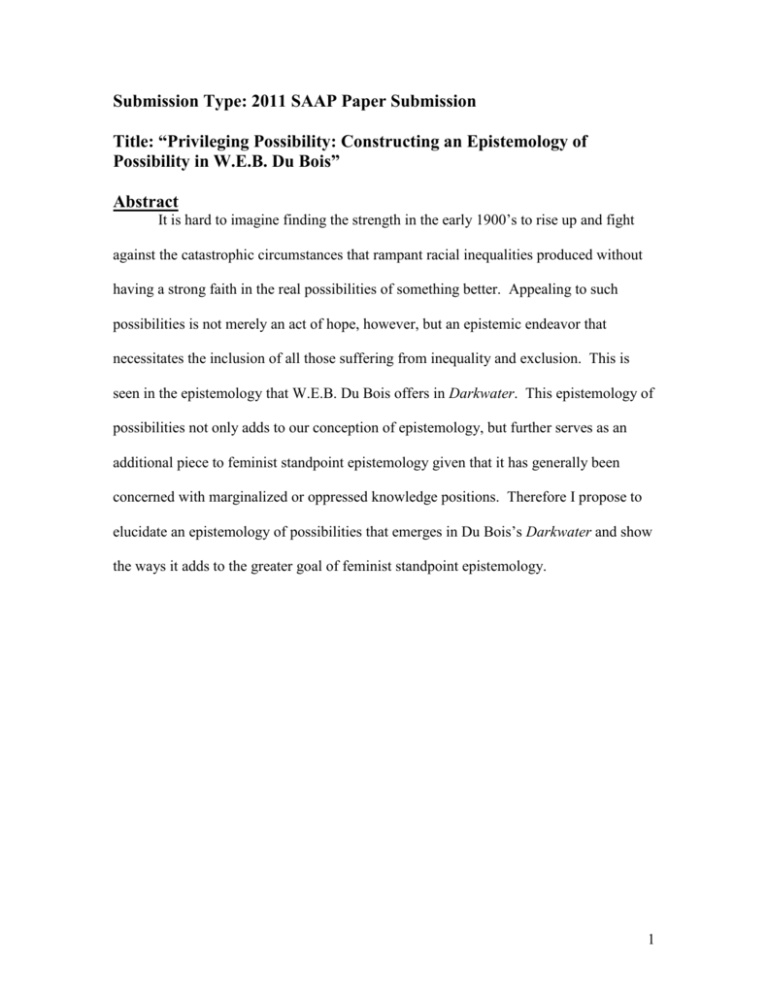
Submission Type: 2011 SAAP Paper Submission Title: “Privileging Possibility: Constructing an Epistemology of Possibility in W.E.B. Du Bois” Abstract It is hard to imagine finding the strength in the early 1900’s to rise up and fight against the catastrophic circumstances that rampant racial inequalities produced without having a strong faith in the real possibilities of something better. Appealing to such possibilities is not merely an act of hope, however, but an epistemic endeavor that necessitates the inclusion of all those suffering from inequality and exclusion. This is seen in the epistemology that W.E.B. Du Bois offers in Darkwater. This epistemology of possibilities not only adds to our conception of epistemology, but further serves as an additional piece to feminist standpoint epistemology given that it has generally been concerned with marginalized or oppressed knowledge positions. Therefore I propose to elucidate an epistemology of possibilities that emerges in Du Bois’s Darkwater and show the ways it adds to the greater goal of feminist standpoint epistemology. 1 Paper Submission: Introduction In an optimistic moment W.E.B. Du Bois muses, “What a world this would be when human possibilities are freed, when we discover each other, when the stranger is no longer the potential criminal and the certain inferior!”1 One can’t help but wonders if this appeal to the possibilities tucked away in humanity is representative only of a momentary overexcitement in human potential, or if there is something more Du Bois is appealing to. One place to begin looking for answers is in the epistemology created by Du Bois in Darkwater. The particular epistemology that emerges from Du Bois is one concerned with marginalized epistemic positions and the knowledge these positions contain. This emphasis on marginalized standpoints is similar to reformulations that have come out of feminist critiques of epistemology. Therefore, the role of possibilities as it functions in Du Bois’s epistemology is something new that can be added to the larger conversation of feminist standpoint epistemology. In order to place the epistemology of Du Bois in the larger context of feminist standpoint epistemology a small overview epistemology will first be given. This will be followed by a relevant critique of feminist epistemology formed by Uma Narayan. Next, what an epistemology of possibility would entail will be explored through W.E.B. Du Bois’s Darkwater. This exploration will include how Du Bois’s epistemology of privileging of the various possibilities different standpoints bring answers Narayan’s critique. 1 W.E.B. Du Bois, “Of Work and Wealth” pp.78. 2 Standpoint Epistemology and Du Bois’s Possibility Traditional epistemology has been under scrutiny from feminists, post-colonial, and race theorists for quite some time and continues to be a site for productive engagement. The traditional epistemic frameworks under scrutiny generally situate a knower as a neutral, rational observer and the knowledge generated from this ‘objective’ viewpoint as neutral and value-free.2 Many feminists contend that this ‘objectivity’ is in fact a masquerade and that the supposedly neutral ‘knower’ is really male, western, and privileged; thus the knowledge generated from this false neutrality is not value free and instead contains the values imbedded in this social position. As a result, in an attempt to undermine this “abstract, rational, and universal image” of a neutral knower creating ‘value free’ knowledge, feminists have advanced a standpoint theory of epistemology. Feminist standpoint epistemology claims that “in contrast to the modernist view” of an abstract, universal knower “knowing agents are local and heterogeneous” because “agents as knowers are “embodied,” having specific gender, racial, class, historical, and cultural locations that shape the content of their thought”.3 Attention to the sociohistorical standpoint of an agent makes who the knower is and where the knower comes from as epistemologically relevant fact. Furthermore, some feminists have claimed that particular standpoints coming out of marginalization or oppression can contain a certain kind of privileged knowledge. Marginalized standpoints can be seen as privileged in the sense that they challenge the dominant paradigm by incorporating a view of both the oppressed and oppressor. For instance under the paradigm of patriarchy women can be seen bringing 2 3 Elizabeth Potter, Feminism and Philosophy of Science: An Introduction, pp. 136. Ibid. 3 an “ “outsider” perspective to epistemological issues that provides insights not readily accessible to men, who benefit from the status quo and who therefore have less incentive to question it.”4 In other words “oppressed groups, whether women, the poor, or racial minorities may derive an “epistemic advantage” from having knowledge of the practices of both their own contexts and those of their oppressors.”5 Additionally, then, constructing marginalized standpoints as containing a certain kind of privileged insight brings value to knowledge claims and knowledge positions that may have been previously devalued under the traditional epistemic paradigm. Feminist standpoint theory and the theories of privilege that accompany some conceptions have not, however, come without critiques. Since neither feminist standpoint epistemology nor the critiques constitute a homogenous group I will continue to focus on the standpoint epistemology that inscribes privilege with marginalized positions in conjunction with a critique of this method by Uma Narayan. In “A Nonwestern Feminist on Epistemology” Narayan recognizes the useful tools that come out of feminist standpoint epistemology, and the revaluing of previously discarded knowledge as a positive but complicated task. Using her nonwestern standpoint Narayan outlines four different lines of thought in feminist standpoint epistemology, critiquing three of them. First, Narayan reminds us that some “themes of feminist epistemology may be problematic for nonwestern feminists” due to the function that traditional roles of women play in nonwestern societies as the main, and sometimes only, site that ascribes any kind of importance to women.6 She claims, “in nonwestern countries feminists must still stress the negative sides of the female experience within that culture and that the time for Jorge Valadez, “Standpoint Epistemology and Women of Color” pp. 72. Uma Narayan, “A Nonwestern Feminist on Epistemology” pp. 265. 6 Ibid., pp. 258. 4 5 4 a more sympathetic evaluation is not quite ripe.”7 In other words, this makes ascribing privilege to a historically devalued epistemic position and the knowledge it generates risky; it allows oppressors to claim that since such traditional locations are so privileged, the oppressed should just stay there, and are perhaps not oppressed at all. Next she critiques the emphasis western feminists put on the marginalizing effects of positivism because in many nonwestern settings positivism is not the main culprit and yet the marginalization of certain epistemic positions occurs nonetheless. By keeping the focus on positivism, some of the other culprits in epistemic disenfranchisement may escape culpability. Lastly, Narayan questions the privileging of the “critical perspective” and “double vision” that oppressed groups may have by claiming that this double vision doesn’t always lead to a positive criticism of oppression. Indeed, this critical perspective ascribed to oppressed peoples can have negative ramifications by keeping one in a schizophrenic state of constantly choosing between two views, of accepting the oppressors view as better, or feeling alienated by both sides.8 These critiques of feminist epistemology do not lead Narayan to conclude that we should abandon it but, instead, that critical analysis of different settings needs to be continually considered. Narayan’s critique is timely given the various minority communities that constitute the West, many of them immigrant communities that have brought their traditions with them, her critiques speak well to the multiple considerations and epistemic positions that should be attended to. By considering these critiques a conception of epistemic privilege dynamic enough to account for those marginalized through various 7 8 Ibid., pp. 259. Ibid., pp. 266. 5 factors can be constructed. This new conception can be thought of as an ‘epistemology of possibilities’ and will be elucidated through W.E.B. Du Bois. An epistemology of possibility highlights the epistemic function of formulating particular possibilities of what can be on the basis of knowledge that is garnered from particular experiences of oppressed positions. It is this function of creating possibilities on the basis of certain experiences unavailable to those in dominant epistemic positions that allows for a privileging of marginalized standpoints. If we consider that epistemic standpoints are characterized by distinctive relations which produce a unique set of possibilities, the hypothesis creation that arises from such unique standpoints serve to set up a range of hypothetical conditionals that express different possible courses of actions. These hypothetical conditionals and the possibilities that they open up are key part in arguing for the inclusion of marginalized standpoints as necessary in developing the widest picture of any epistemic community. Those in the margins have had to place a strong emphasis on possibilities that their experience and knowledge led them to create as a mechanism for survival. Martin Luther King Jr.’s “dream” can be seen as a tangible possibility forged out of the knowledge of the oppressive structure of racism, and the possibilities that could be reached in its elimination. W.E.B. Du Bois gives us a conception of standpoint epistemology that privileges the knowledge of the oppressed because of the possibilities for change they can introduce into larger contexts. Du Bois is keenly aware that he is equipped with a knowledge forged out of racism and that this knowledge has thus far been ignored. In the “Postscript” he states that he is aware of the things “of which men think” and that he has “only to add a point of 6 view: I have been in the world, but not of it;” his knowledge has been ignored by larger epistemic communities and Du Bois thus calls for its inclusion. 9 He calls for this epistemic inclusion on the basis that marginalized epistemologies bring new possibilities, which aren’t present in the dominant paradigm. This leads to his formation of a new possibility for the meaning of whiteness, his claim that democracy needs to include the possibilities inherent in all people, and finally the new possibility of womanhood as exemplified through black women. Du Bois realizes his marginalized epistemic position has been forged from his experiences and thus that this epistemic position can be used to inquire into the larger problem of racism. In “The Souls of White Folk” Du Bois describes himself sitting high above the human masses in a “tower”, a position that allows him to “see in and through” the “Souls of White Folk”.10 Coming from what he describes as “unusual points of vantage,” evoking the “Double Consciousness” he is famous for, Du Bois is positioned to see into the nature of whiteness in a unique way.11 This knowledge position, his seat in the tower, is not given but attained through the experience of being black in America. As Du Bois tells us, the knowledge he gains of white folk is “not foreign…not the knowledge of the traveler or the colonial composite” but is instead a knowledge derived from the “bone of their thought and flesh of their language”.12 That is, particular ideas and actions coming from white America lead to experiences that allow Du Bois not only see the ways “their thought” and “language” construct him as a black man, but how it W.E.B. Du Bois, “Postscript” pp. xxiii. W.E.B. Du Bois, “The Souls of White Folk” pp.21. 11 Ibid. For an in depth treatment of how Du Bois situates how he can see both what white people think of him as a black man and themselves as priviledges whites, see The Souls of Black Folk where he explicitly talks about ‘double conciousness’. For the purpose of this essay espitemology will be extracted from places such as “The Souls of White Folk” where it can more easily be missed. 12 Ibid. 9 10 7 simultaneously constructs whiteness as well. Du Bois is thus able to critique whiteness because he has access to a particular form of knowledge that comes from an epistemic position formed out of racial oppression. In his critique, Du Bois is able to form new possibilities of what whiteness as a racial category means. For example, he places the emergence of the category of whiteness in connection with a racial hierarchy that puts whiteness at the top and is institutionally perpetuated. The institutional perpetuation is shown to persist in schools simply “by emphasis and omission to make children believe that every great soul…was a white man’s soul…every great thought…a white man’s thought.” 13 This hierarchy allows knowledge claims to take on an authoritative position that both perpetuates and does not disrupt the “assumption that of all the hues of God whiteness alone is inherently and obviously better than brownness.”14 In order to challenge the knowledge claims coming out of the epistemic position of whites Du Bois appeals to other possibilities of what whiteness mean, inserting his own knowledge claims and constructing whiteness as oppressive and dominating. This destabilizes the notion of whiteness as superior by adding other possible notions that he was able to create from his particular epistemic position. Furthermore, Du Bois argues that the particular knowledge that arises from marginalization must be given a voice in order for different possibilities of larger relations to be taken into account. We see the recognition of this unvoiced knowledge in “Of The Ruling Of Men” where epistemology and democracy go hand in hand. Du Bois illustrates the inability of one to truly know the thoughts or ideals in others by invoking 13 14 Ibid., pp. 22-23. Ibid., pp. 22. 8 something like James’ theory of “certain blindness.”15 Du Bois tells us that when forming democratic practices, “intelligent men, not only knew little about each other but less about the action of men in groups” which led them to false assumptions of who could and should vote. 16 He then claims that the vote needs to be extended to everyone in society regardless of skin color, gender, or class since those who have thus far been ignored in the democratic process are in fact situated in an epistemic position and that this knowledge regarding one’s own situation must be voiced through their vote.17 The fact that many segments of society have been denied the right to vote denies the state as a whole of “The vast and wonderful knowledge of this marvelous universe” that is “locked in the bosoms of its individual souls.”18 By making the argument that every individual contains within them a particular knowledge that must be used in order to make the state as a whole the best it can be, Du Bois calls for universal suffrage by respecting the many places that knowledge can come from and the many unlocked possibilities in those positions. Du Bois directly says that “only the man himself, however humble, knows his own condition” and that it is here where we find “sources of knowledge” that are yet untapped.19 Not only is it true that “only the sufferer knows his suffering” but also “that no state can be strong which excludes from its expressed wisdom that knowledge possessed by mothers, wives, and daughters” or any other William James, “On Some of Life’s Ideals” pp. 3-4. James talks about a “blindness” that prevents us, “in an absolute way on the value of other person’s conditions or ideals 16 .W.E.B. Du Bois, “Of the Ruling of Men” pp. 105. 17 Ibid., pp.111. Du Bois claims that even “the best monarchy, suffered from lack of knowledge” since “in the last analysis only the man himself, however humble, knows his own condition” and that democracy gives us a chance, through the vote, to allow each person regardless of background to make their interests known. 18 Ibid., pp. 109. 19 Ibid., pp. 111 15 9 disenfranchised group.20 Thus, this theory of democracy is based on the inclusion of all in a society since everyone, even the most humble, come from a particular knowledge position which allows for certain possibilities to form that are invaluable to the democratic process and the strength of the nation. Strength and invaluable knowledge also comes from the last place we will search for epistemology in Du Bois, the place of women. In, “The Damnation of Women” Du Bois writes about the predicament of black women. What is important to note is that because he sees black women coming from a particular vantage point, a new knowledge of the world and women’s place in it emerges. In fact, when describing the various movements of the “modern cause” such as “the problem of the color line and the peace movement” Du Bois remarks that when, “two of these movements – women and color – combined in one, the combination has deep meaning.”21 This deep meaning is expressed in the way that black women have reformulated traditional womanhood. The particular history of oppression and struggle that black women are situated in significantly challenged the reigning idea of women and work. Du Bois sees the damnation of women to be an ideal of womanhood that demands the sacrifice of intelligence and work in order to have children.22 However, economic circumstances forced black women to work whether or not they had children and Du Bois argues that instead of deploring these women this model of womanhood should be supported as an “efficient womanhood” as a new, and for Du Bois better, possibility of what womanhood 20 Ibid., pp.112. W.E.B. Du Bois, “The Damnation of Women” pp. 140. 22 Ibid., pp. 128. Du Bois says that what the world wants is “healthy babies and intelligent workers” but that “Only at the sacrifice of intelligence and the chance to do their best work can the majority of modern women bear children. This is the damnation of women.” 21 10 could be that is formed directly out of black women’s realities. This new definition opens up new possibilities for freedoms and rights for women and Du Bois acknowledges and promotes these freedoms saying that women must have “life work and economic independence. She must have knowledge. She must have the right of motherhood at her own discretion.”23 These freedoms are both demanded by and can be attained by a new model of womanhood, efficient womanhood, as they promote intelligence, work, and having children as in agreement with each other. Traditional roles of women are thus opened up by providing new ways of considering women’s roles that reflect the experiences of the women Du Bois is concerned with. After examining these new possibilities for race, democracy, and gender roles how Du Bois’s epistemology responds to Narayan’s concerns can now be turned to Narayan’s first concern is that when standpoint epistemology revalues the position of women that are marginalized because of the knowledge it creates, there is a risk that this revaluation functions to keep women in traditional roles, even if these roles are harmful. Du Bois privileges certain epistemic positions because of the new possibilities they bring to a situation to conceive of “true and worthy” ideals that “frees and uplifts a people; a false ideal imprisons and lowers” and the only way to see if an ideal is uplifting or imprisoning is to check it against a larger context or goal.24 This provides a paradigm where traditional roles are being attended to only with a larger goal, or problem in mind. For example Du Bois turns to the traditional role of “womanhood” to show how racism and gender intersect in a way that lead black women to actively reconstruct and produce a new model of womanhood. 23 24 Ibid. W.E.B. Du Bois, “The Souls of White Folk” pp. 24. 11 Next, Narayan claims that positivism cannot be the main culprit for epistemic disenfranchisement for everyone. Du Bois is clearly in agreement as positivism is never mentioned. Instead, Du Bois situates a person’s experience as the main factor in creating an epistemic position. This allows for multiple culprits of epistemic disenfranchisement; sexism, racism, positivism, a mixture of all three, or something else entirely. Also, by basing the formation of an epistemic position as something that arises as a result of one’s experience where one is located in relation to certain systems is taken into account. Accordingly, while the system of racism in America equips Du Bois with an epistemic position that allows him to come up with new possibilities regarding the meaning of whiteness or the reason behind the World War25 it is seen to limit the scope of possibility creation for whites. Therefore, the experience of being the dominant race in a system of racism limits the possibility of whites for valuing non-whiteness. Du Bois records this, and his irritation, recalling the numerous well-intentioned whites who see him as a “poor, unwhite thing” who “know, too well, that the curse of God lies heavy” on him.”26 This lack of conceiving better possibilities in relation to race is not always so benign however. Everything in the history of the United States, from slavery to Sunday supplements, from disenfranchisement to residence segregation, from “Jim-Crow” cars to a “Jim-Crow” army draft – all this history of discrimination and insult festered to make men think and willing to think that the venting of their unbridled anger against 12,000,000 humble, upstriving workers was a way of settling the industrial tangle of the ages.27 Du Bois sees the “competition for the labor of yellow, brown, and black folks” as “the cause of the World War.” See “The Souls of White Folk” pp. 32. 26 Ibid., pp. 22. 27 W.E.B. Du Bois, “Of Work and Wealth” pp. 72. In this essay in Darkwater Du Bois describes the East Saint Louis Riots giving a complicated account of the various forces, such as newly free labor from slaves and the interests of industrial giants, that served to turn workers against each other. 25 12 The experience of discrimination here leads white laborers to neglect other possibilities such as forming unions with African American workers and instead leads to the predictable conclusion of blaming black workers, and eventually violence. Lastly, Du Bois is again in agreement with Narayan as he too does not by any means situate marginalized knowledge as purely positive. He is very clear about the pain and suffering racism has caused.28 However, he is equally clear that the knowledge of the sufferer must be used to undo the situation that has caused such pain. He claims that one reason African Americans are denied the right to vote is because “They [those who deny African Americans the vote] assume that white people not only know better what Negroes need than Negroes themselves, but that they are anxious to supply these needs” however “They cannot “understand” the Negroes; they cannot protect him from cheating and lynching.”29 Therefore, even if this double-vision or double consciousness is painful it and the circumstances that formed it can only be made visible, and thus attended to, if the person experiencing it is given a voice. It should be emphasized that this does mean that every person situated in an oppressed position possesses a critical perspective that allows for a revolutionary critique of power structures. But if we take seriously that “no one knows himself but the self’s own soul” in conjunction with problems that some ‘self’s’ might be dealing with such as 28 A particularly telling place of this suffering is in Du Bois’s description of the fear he endures everyday as he worries about and encounters discrimination: “I arise at seven. The milkman has neglected me. He pays little attention to colored districts. My white neighbor glares elaborately. I walk softly, lest I disturb him. The children jeer as I pass to work. The women in the street car withdraw their skirts or prefer to stand. The policeman is truculent. The elevator man hates to serve Negroes. My job is insecure because the white union wants it and does not want me. I try to lunch, but no place near will serve me. I go forty blocks to Marshall’s but the Committee of Fourteen closes Marshall’s; they say white women frequent it.” W.E.B. Du Bois, “Of Beauty and Death” pp. 171172. 29 .W. E.B. Du Bois, “Of the Ruling of Men” pp. 113-114. 13 lynching, it is imperative to give voice to those in oppressed position if only in order to see the fuller picture of the situation.30 Without taking seriously the knowledge from oppressed groups, the possibilities groups may have formed in light of and in response to oppressive practices, may never be illuminated and oppressive structures never dismantled. Conclusion I conclude by returning to another inspiring quote from Du Bois; “Infinite is human nature. We make it finite by choking back the mass of men, by attempting to speak for others, to interpret and act for them, and we end by acting for ourselves.”31 This infinity is seen in the infinite amount of ways human beings can form to live and relate to each other. We can form and function under systems of inclusion or exclusion, oppression or liberation. How one paradigm of relating and living with each other is shifted depends on the possibilities for change and new ways that are put forth by people. Du Bois recognized this and in his effort to find ways of living that didn’t involve racism and prejudice he privileged the formation of new possibilities that accompanied marginalized epistemic positions. By privileging a marginalized epistemic position on the basis of the possibilities it can offer to current problems, a practical reason for privileging certain standpoints that keep a larger problem in view emerges. Du Bois privileged these standpoints because he could see the possibility of a brighter future ahead, even in his darkest moments he never shuts out the possibility for change. 30 31 Ibid., pp. 109. Ibid. 14 Bibliography “Privileging Possibility: Constructing an Epistemology of Possibility in W.E.B. Du Bois” Alcoff, Linda, and Elizabeth Potter, eds. Feminist epistemologies. New York: Routledge, 1993. Du Bois, W.E.B. "Of Beauty and Death." Darkwater. New York: Washington Square, 2004. 105-123. Du Bois, W.E.B. "Of the Ruling of Men." Darkwater. New York: Washington Square, 2004. 171-190. Du Bois, W.E.B. "Of Work and Wealth." Darkwater. New York: Washington Square, 2004. 63-79. Du Bois, W.E.B. "The Damnation of Women." Darkwater. New York: Washington Square, 2004. 127-144. Du Bois, W.E.B. The Souls of Black Folk. Boulder: Paradigm, 2004. Du Bois, W.E.B. "The Souls of White Folk." Darkwater. New York: Washington Square, 2004. 21-37. James, William. On Some of LIfe's Ideals. New York: Henry Holt and Company, 1913. Janack, Marianne. "Standpoint epistemology without the ‘standpoint’?: An examination of epistemic privilege and.." Hypatia 12.2 (1997): 125. Religion and Philosophy Collection. EBSCO. Web. 1 Mar. 2010. Lewis, David. "Introduction." Darkwater. New York: Washington Square, 2004. v-xix. Lewis, David L. W. E. B. Du Bois: A Reader. New York: Owl, 1995. Monterio, Anthony. "Being an African in the World: The Du Boisian Epistemology." The ANNALS of the American Academy of Political and Social Science 568 (2000): 220-34. Narayan, Uma. "The Project of Feminist Epistemology: Perspectives from a Nonwestern Feminist." Gender, Body, Knowledge: Feminist Reconstructions of Being and 15 Knowing. Ed. Alison M. . Jaggar and Susan R. Bordo. New Brunswick (N.J.): Rutgers UP, 1992. 256-72. Potter, Elizabeth. Feminism and Philsophy of Science: An Introduction. New York: Routledge, 2006. Print. Understanding Feminist Philosophy. Valadez, Jorge. "Standpoint Epistemology and Women of Color." Women of Color: Defining the Issues, Hearing the Voices. Ed. Diane Long. Hoeveler and Janet K. Boles. Westport, Conn.: Greenwood, 2001. 69-80. 16


